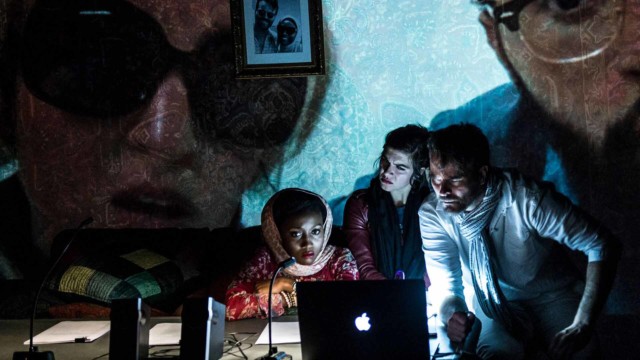This past year has made me realize we’ve all chosen to be blind and indifferent to the hundreds of thousands of people who’ve died in the Syrian civil war. Almost every night, images from the fighting flood our living rooms and our small screens. We’re all horrified when we see video of the dead and dying in Aleppo, a city that’s been all but reduced to rubble.
Ahmad Coo is a producer and copy editor for the Global Business America show on CCTV America. His analysis represents his views alone.
We even shed tears as we saw on television countless pictures of bloodied children, some shell-shocked, some struggling to breathe, some with lifeless eyes. But as the conflict enters its sixth brutal year, our gasps, tears and outrage have turned into a morbid acceptance of how things are in Syria.
Some of us even choose to give to humanitarian groups to help ease the suffering of millions of people trying to escape their war-torn country. Frankly speaking, it’s to help us — myself included — feel less powerless and guilty. But the bloodshed continues and we all gawk like helpless bystanders at what is now one of the biggest conflagrations the Middle East has ever seen.
Television coverage will continue, as will the countless stories of heroes and good samaritans risking their lives to save children from bombs and gunfire.
But as more people die, news coverage of the conflict seems to shrink faster and faster. Here in the U.S., the news has even become more intensely parochial. Football games get obnoxious amounts of coverage, while the bombing of Aleppo gets 30 seconds on the nightly news.
But Syria will not go away. It will remain in the back of our minds like a festering sore. Even the U.S. presidential vote is tinged with it.
Who hasn’t heard Donald Trump and his spawn talk about Syrian refugees and the danger they pose to the country? Nevermind that there’s never been a Syrian asylum seeker who’s successfully carried out a terrorist attack on U.S. soil. Hillary Clinton’s take isn’t much better.

(L-R) Gabriela Fernandez-Coffey, Shannon Dorsey, Tim Getman, and Joe Mallon in “Kiss”. Photo by Teresa Castracane for Woolly Mammoth.
Then there are some of us who pretend to understand the complexities of Syria. That we get why the conflict is so intractable, that we know why these groups are killing each other by simply watching some policy wonks and historians on the idiot box – an exercise in futility in of itself.
Some of these “experts” profess without a hint of irony that they have a wider view of the conflict than do most Syrians. But no one is appalled or astonished at these claims. Why should they be, when there are no Syrian voices to be heard?
And how can Syrians express the unspeakable traumas they’ve suffered when they’re still in the midst of it?
So who can speak for and about a country that’s fast disintegrating? More often than not the picture that is painted for us is a limited representation from people who are far removed from the conflict.
Obviously hundreds of thousands of Syrians have made good their escape, but there hasn’t been a sustained or even cohesive effort to cover their exodus. We get snippets of their journey, as most of their sentiments reduced to 30 second soundbites.
Most times we end up looking to experts and so-called specialists to understand conflicts not just in Syria, but other geopolitical flashpoints.
It’s usually this attempt to comprehend the world around us that lead many of us to rely on flawed paradigms and national narratives, which are acutely scrutinized and dissected by Chilean playwright Guillermo Calderon in his latest work “Kiss” which is playing at Washington D.C.’s Woolly Mammoth theater.
The play centers itself on the civil war that’s been raging in Syria since 2011.
Calderon has never written about the country before “Kiss”, much less witness the conflict up close. If anything, he’s just like myself and everyone else living in the United States, we glean all our knowledge and analysis from the comfort of our little insignificant lives.
Still the war looms large in our collective consciousness for the sheer brutality of it.
But oddly enough the play opens on a light note with the characters in the midst of a staging of a script they recently found on the internet.
It’s a television melodrama written by a woman who’s still living in Syria. Silliness abounds in their reading of the script. Almost every line is delivered with a hamminess that has most of the audience laughing.
It’s almost unbelievable that someone living in the midst of a brutal civil war could come up with something like this. But it gets more funny as the main protagonists get caught in a pair of love triangles and ends in a comically tragic way.
The second act opens with the producers finally getting in touch with the woman who supposedly wrote the play.
Speaking through Skype, the actors talk about their production of her play. They praise her work and ask how she came up with such a funny script.
She’s disguised in a wig and large sunglasses to hide her face because she’s in politically precarious position.
Slowly, it dawns upon the eager, albeit clueless American actors that they’ve completely misread and misunderstood her script. Writing a farce was the farthest thing from her mind.
She really wanted to present the terrifying reality all Syrians face, but through the medium of a melodramatic soap opera.
In fact, the soap opera became one of the vehicles of protest against Basar al-Assad in the years leading up to the civil war. After the fighting broke out, a lot of the production houses making these soap operas were forced to relocate to London and Lebanon.
After their Skype session, the actors decide to do another reading of the play. This is where Calderon’s production soars.
He’s a master of throwing off audience expectations and giving them something completely unexpected. In this case, the shift in tone is so dramatic he practically ripped my heart out of my chest cavity, threw it on the ground and stomped on it until it was red mush.
He made the second act as uncomfortable to watch as he could, not just for shock value but to jolt us to realize that watching countless Syrians die while their country burns is unconscionable and inexcusable.
But even as Calderon pushes audiences to understand the country’s civil war, he also wants us to question whether we can really fathom the violence facing millions of Syrians.
“Kiss” doesn’t offer easy answers, especially when Calderon highlights the limitations of art and language in trying to make sense of a conflict so far removed from the rest of the world.
But even if he did present a work that removed any doubt about the meaning of the Syrian civil war, what then? Does it give us any agency in trying to help millions of people escape certain death from a conflict that’s increasingly intractable?
In the end, any audience confronted with such ugliness and violence can only feel a sense of helplessness and powerlessness, much like the millions of Syrians who find themselves in impossible circumstances.
 CGTN America
CGTN America
 (L-R) Lelia TahaBurt, Shannon Dorsey, Gabriela Fernandez-Coffey, Tim Getman, and Ahmad Kamal in “Kiss”. Photo by Teresa Castracane for Woolly Mammoth.
(L-R) Lelia TahaBurt, Shannon Dorsey, Gabriela Fernandez-Coffey, Tim Getman, and Ahmad Kamal in “Kiss”. Photo by Teresa Castracane for Woolly Mammoth.

